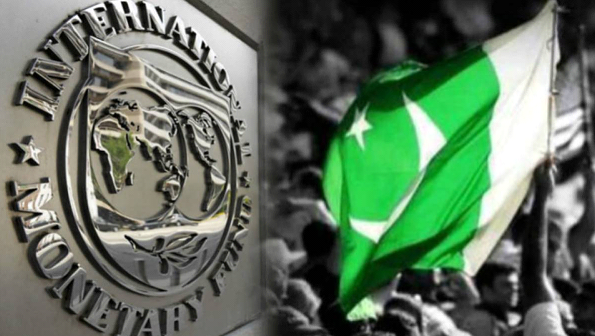IMF ke maamlay mein Pakistan Govt aur IMF ke staff ne Pakistan ke Stand-By Arrangement (SBA) ke teht pehle review par staff-level agreement par pahuncha hai, jo ke IMF ke Executive Board ki manzoori par munhasar hai. Manzoori ke baad, Pakistan ko SDR 528 million (approx US$700 million) milengay.
“Ye agreement GOVT ki taahid mein hai ke woh maazi mein kaarobaari sanjeeda saff bandi ko aagay badhayen, energy sector mein kamayabi hasil karne ke liye tanazaat ko tezi se pura karen, bazaar ki hesiyat se munsalik exchange rate mein wapas jana ho, aur tijarat ko bharpoor karnay ke liye state-owned enterprise aur governance reforms ko aagay barhayein, jabke samaji madad ko mazeed taqwiyat dete hue.”
Washington, DC: International Monetary Fund (IMF) ke team, jis ka sadr Nathan Porter tha, ne 2-15 November, 2023 tak Islamabad ka daura kiya, taake IMF Stand-By Arrangement (SBA) ke zariye madad hasil karne wale Pakistan ke maashiyati program ke pehle review par guftagu ki. Guftaguon ke ikhtitam par, Mr. Porter ne ye bayan diya:
“IMF team ne Pakistani authorities ke saath SBA ke teht unke stabilization program ke pehle review par staff-level agreement (SLA) par pahuncha hai. Ye agreement IMF ke Executive Board ki manzoori par munhasar hai. Manzoori ke baad, karib US$700 million (SDR 528 million) dastiyab honge, jisse is program ke teht mukammal amount 1.9 billion dollar tak pohanchegi.
“SBA ke tahqiqati policies ke teht, ek achay mustaqbil ki taraf rawangi ka aaghaz hai. FY24 budget ke mustaqil istemal, energy prices mein tarteeb, aur foreign exchange (FX) market mein new reforms ne maali dabao ko kam kar diya hai. Inflation ka imkaan hai ke aane wale mahinon mein ghatay. Lekin Pakistan ko kisi bhi waqt asasani se doosre mulkon ke sath sargarmi, maal o dawat ke prices mein izafah, aur global maali shorat mein izafah jese muamlat ka samna karna ho sakta hai. Madad karne wale amal ko barqarar rakhne ki zarurat hai.
“In this regard, strengthening macroeconomic sustainability and laying the conditions for balanced growth are key priorities under the SBA. The authorities’ policy priorities include:
- Continued fiscal consolidation to reduce public debt, while protecting development needs. The authorities are determined to achieve a primary surplus of at least 0.4 percent of GDP in FY24, underpinned by federal and provincial government spending restraint and improved revenue performance supported, if necessary, by contingent measures. The authorities are building capacity to expand the tax base and raise revenue mobilization and are committed to improving the quality of public investment and spending.
- Strengthening the social safety net to better protect the vulnerable. The authorities will continue the timely disbursements for social protection under BISP’s budget allocation—which are about a third higher than in FY23. This will allow for the expansion of the Unconditional Cash Transfers (UCT) Kafaalat program to 9.3 million families this fiscal year, with an annual inflation adjustment of the stipend. Looking forward, the authorities are seeking to improve the UCT Kafaalat generosity level and to increase enrollment into the Conditional Cash Transfers programs supporting children’s education and health.
- Further reforms to reduce costs in the energy sector and restore its viability. With the combined circular debt (CD) across power and gas sectors exceeding 4 percent of GDP, immediate action was critical. While protecting vulnerable consumers, the authorities implemented power tariff adjustments that were pending since July 2023 and increased gas prices after a long time, effective November 1, 2023. While these increases were substantial, they were necessary to avoid further arrears that threatened the viability of these sectors and the provision of critical energy supplies. The authorities are also moving to tackle cost-side pressures, including bringing private sector participation to DISCOs, institutionalizing recovery and anti-theft actions, improving PPA terms, and reducing the incentives for captive power.
- Returning to a market-determined exchange rate and rebuilding FX reserves. While inflows following increased regulatory and law enforcement helped normalize import and FX payments and rebuild reserves, the authorities recognize that the rupee must remain market-determined to sustainably alleviate external pressures and rebuild reserves. To support this, they plan to strengthen the transparency and efficiency of the FX market and to refrain from administrative actions to influence the rupee.
- Proactive monetary policy to lower inflation toward its target. With appropriately tight monetary policy, inflation should steadily decline and the authorities stand ready to respond resolutely if near-term price pressures reemerge, including due to second-round effects on core inflation or renewed exchange rate depreciation.
- Building financial sector resilience. Continued vigilance is warranted to safeguard the soundness of the banking system. Priorities include addressing undercapitalized financial institutions, ensuring foreign exchange exposures within regulatory limits, and aligning bank resolution and crisis management frameworks with best practice.
- Continuing state-owned enterprise and governance reforms to improve the business environment, investment, and job creation. Following passage of the State-Owned Enterprises (SOE) law, the authorities are moving forward with their SOE policy and implementation of their triage plan, including the privatization of select SOEs. High governance and transparency standards will apply to the management of assets under the ownership of the newly created Sovereign Wealth Fund (SWF) and the operations of the SIFC. To further strengthen governance, the authorities will ensure public access to asset declarations from Cabinet members and a task force, with participation from independent experts, will complete a comprehensive review of the anticorruption framework.
- Deepening cooperation with international partners. The authorities have accelerated the engagement with multilateral and official bilateral partners. Timely disbursement of committed external support remains critical to support the authorities’ policy and reform efforts.
“IMF team Pakistani authorities, private sector aur development partners ko is mission ke doran guftaguon aur taawun ke liye shukriya ada karte hain.”





